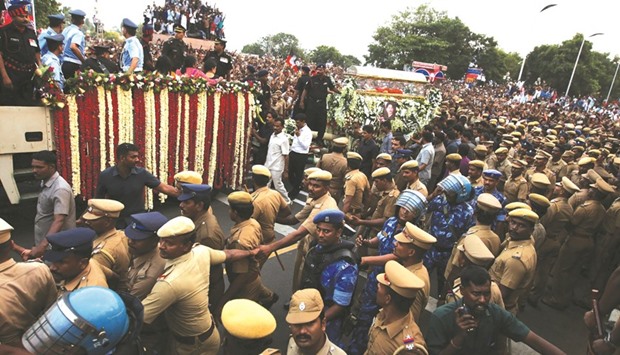Hundreds of thousands of mourners paid an emotional final farewell yesterday to Tamil Nadu Chief Minister J Jayalalithaa as the former movie star who enjoyed god-like status was buried.
A day after the 68-year-old died following a massive weekend cardiac arrest, huge crowds lined the street of Chennai as Jayalalithaa’s coffin was taken to its final resting place.
Mourners clambered onto statues, trees and soft drinks stalls that lined the city’s Marina beach, eager to view the cortege.
Television put the number of mourners at around 1mn.
As the sun began to set, Jayalalithaa’s confidante Sasikala performed the final rituals overseen by a Brahmin priest before her tricolour-draped body in a sandalwood casket was lowered into a grave near the memorial to her mentor M G Ramachandran.
As an era ended in Tamil Nadu, Jayalalithaa’s last journey started from Rajaji Hall, where hundreds of thousands thronged for a final look at their iconic leader, and slowly moved towards the Marina Beach flooded with mourners.
The 3km procession through Chennai streets, packed on both sides by men and women, many weeping, took more than an hour.
The chief of the ruling All India Anna Dravida Munnetra Kazhagam was laid to rest with full state honours next to MGR, who brought the young Jayalalithaa from the film industry into the male-dominated Dravidian politics.
Her successor Chief Minister O Panneerselvam, and Sasikala, dressed in black, were seated on the military truck that towed the glass casket-laden carriage with Jayalalithaa’s body.
Despite being twice jailed over allegations of corruption, the woman known simply as Amma, or mother, was a revered figure in Tamil Nadu and one of India’s most popular and successful politicians as a populist champion of the poor.
Prime Minister Narendra Modi flew to Chennai to pay his own respects.
President Pranab Mukherjee, chief ministers from Delhi, Andhra Pradesh, Odisha, Uttar Pradesh, Karnataka and Puducherry, Congress vice president Rahul Gandhi and others too paid their last respects as streams of her supporters lined up outside the Rajaji Hall where her casket was on display.
While the coffin was wrapped in an Indian flag, many of the mourners were wearing scarves with the red, white and black colours of her party.
Many of the women mourners screamed hysterically and wept, although there were no reports of serious unrest amid a large security presence.
“It is a very sad day. She was an essential part of the state. She was meant for greatness,” said Christina Paun, a 34-year-old university professor who was among those queueing to pay their respects.
“She had a very difficult life in a male-dominated society but she was always different. She was always great. She had perfect control over her emotions.
“She has left a big void and we will have to see if someone can fill her shoes.”
Famed for a vast sari collection that won her comparisons with Imelda Marcos, Jayalalithaa was also one of India’s most polarising politicians, seen by some as an autocratic and secretive leader.
But nothing could dent her popularity in Tamil Nadu, where she was elected chief minister on four occasions in a period when it became one of India’s most prosperous states.
Jayalalitha first made her name starring in movies alongside MGR, who later became her political mentor before his death nearly 30 years ago.
Although most Hindus are cremated, Jayalalithaa had requested in her will that she be buried alongside her former co-star in his memorial building.
As her coffin was lowered into the ground inside the mausoleum, thousands of petals were scattered on top.
Hundreds of supporters had kept a round-the-clock vigil outside the Apollo Hospital since she was first admitted in September suffering from a fever.
When she first fell ill one supporter set himself on fire, while an elderly man suspended himself from a crane with steel hooks pierced through his skin.
“The people are very depressed. We were expecting her to recover even yesterday. She is the bravest lady in the world,” said Manohar, a businessman who was among the queue of mourners.
Tamil Nadu has declared a week-long mourning, during which schools and colleges will be shut for three days.
No state transport corporation buses plied yesterday and millions stayed indoors.
The central government too announced a day of mourning.
The state had been tense since Sunday after reports that her health had worsened and she had been put on life support.
On Monday scuffles broke out outside the hospital as many of her thousands of supporters there tried to break through police barricades.
When MGR died in 1987, riots and looting broke out across the state.
Security had been reinforced across Tamil Nadu ahead of Jayalalitha’s death over fears of an emotional reaction.
Jayalalithaa earned the loyalty of many voters with a series of populist schemes, including “Amma canteens” that provided lunch for just Rs3 and vast election-time giveaways.
Several of her supporters resorted to self-harm when she was briefly jailed in 2014 on charges of corruption.
Her conviction, later overturned on appeal, sparked mass protests and even some reported suicides.
Jayalalithaa’s death has plunged one of India’s most economically powerful states into a period of political uncertainty.
Though Panneerselvam was sworn in as chief minister, observers are uncertain whether a loyalist who lacks mass support will be able to rule smoothly.
Tamil Nadu is an important economic centre in India and a base for auto firms Ford Motor Daimler, Hyundai and Nissan and IT firm Cognizant.
Panneerselvam had stood in for Jayalalithaa in the past, but made clear he was not replacing her.
He declined to take her place at the head of the cabinet table while she was ill and instead had her picture placed there.
His rise to the top job in Tamil Nadu was aimed at allaying fears of a power struggle in the AIADMK, which Jayalalithaa had ruled with an iron hand.

Supporters of Jayalalithaa crowd around the vehicle carrying her body during her funeral procession in Chennai yesterday.
